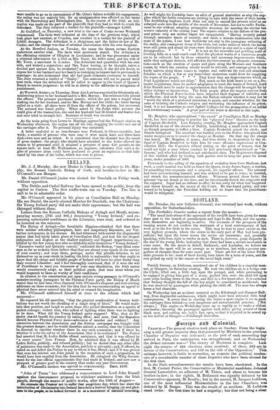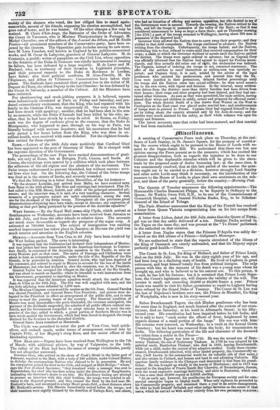Jordan an Colonial.
FaaNcn.—The general election took place on Sunday. From the begin ning a still greater majority than that possessed by Ministers in the previous Chamber of Deputies was indicated; as the post of each succeeding day arrived in Paris, the anticipation was strengthened; and on Wednesday the Debate estimate was—" The victory of Ministers is complete. Last night the returns of 422 elections were received: of these, 263 are in favour of the Conservatives, and 159 on the side of the Opposition." This estimate however, is liable to correction, as respects the political tenden- cies of a considerable number of those Deputies who have been elected for the first time.
In the Paris arrondieeements the results have been checkered. In the first, M. Casimir Perier, the Conservative or Ministerial candidate, defeated General Lamorkiere, an adherent of M. Thiers, and about to become his brother-in-law; in the eighth, M. Bethmont was signally defeated by his Conservative opponent, M. Beudin; but in the second, M. Jacques Lefebvre, one of the most influential lifinisterialists in the late Chambers, was defeated by hi. Berger. This was the result of an accident. M. Lefebvre stood twice : the fait gaga he Itad is majority; but that not being a Akeir,
Moiety of the electors who voted, the law obliged him to stand again: meanwhile, several of his friends, supposing his election accomplished, had gone out of town; and he was beaten. Of the other changes a few may be noticed. M. Chaix d'Est-Ange, the Battonier of the Order of Advocates, the Count de Varennes, who is Minister Plenipotentiary in Portugal, M.
Michel Chevalier, one of the editors of the Journal des DeZola, and M. Emile
Pereire—all prominent members of the Conservative party, have been re- jected by the electors. The Opposition gain includes among its new mem- bers M. Leon Faucher, well known in England by his politico-economical works, and M. Oscar de Lafayette, grandson of General Lafayette. M. de Cormenin, a prolific writer of pamphlets on the Civil List, whose opposition to the dotation of the Duke de Nemours was chiefly instrumental in causing its failure, has been defeated by a large majority. M. de Larey and M. Bechard, who, in testimony of their devotion to Legitimist principles, paid their personal respects to the Duke de Bordeaux in London, have failed; also their political confreres, M. Gras-Preville, M. De l'Espinasse, and Alban de Villeneuve: Conservatives have taken their places. The Radicals have sustained their greatest loss in the defeat of M. Dupont de l'Euns, the oldest Deputy in the last Chamber: he was defeated by the Count de Salvandy, a member of the Cabinet. All the Ministers have been reelected.
For electioneering and stock-jobbing purposes, it is believed, reports were industriously circulated at Paris on Friday and Saturday, and pro- duced extraordinary excitement, that the King, who had repaired with his family to the Chateau d'Eu, was dangerously ill. One story was, that he had been struck with apoplexy; another, that he had been shot in the arm by an assassin, while the Duke d'Aumale had been killed by his side; an- other, that he had been struck by a coup de soleil. At Rouen, on Friday, such was the degree of credence given to the rumour, that the Duke de Montpensier, who happened to pass through on his way to Paris, was literally besieged with anxious inquirers; and his assurances that he had only parted a few hours before from the King, who was then in ex- cellent health, were received with some disbelief. Not the slightest founda- tion existed for these reports.
ROME.—Letters of the 20th July state positively that Cardinal Gizzi has been appointed to the post of Secretary of State. He is charged with the supreme direction of the Government. The proceedings of the new Pope have excited demonstrations of grati- tude, not only at Rome, but at Bologna, Forli, Cesena, and Imola. At Cesena, the rejoicings were marred by a collision which took place between the adherents of the old regime and the abettors of the movement. The Swiss troops endeavoured to prevent bloodshed, but without success: seve- ral lives were lost. On the following day, the Colonel of the Swiss troops was fired at in the streets of Imola, and severely wounded.
We find the following in a letter from Marseilles, of the 1st instant-
" By the steamer Leonidas, just arrived from Malta, we have received news from Rome to the 28th ultimo. The fates and rejoicings had terminated. Pius IX. had called to him MM. Rienzi, Galetti, and other of the principal amnestied pri- soners; and the interview was, it is said, of a very touching character. Several measures of a progressive nature are under consideration; among the rest, one for the dismissal of the Swiss troops. Throughout• all the provinces great demonstrations of rejoicing have been made, except at Ancona; any expression of feeling at that port wing paralyzed by the presence of the Austrian squadron."
WEST INDIES.—: By the Royal Mail steam-ship Clyde, which arrived at Southampton on Wednesday, accounts have been received from Jamaica to the 9th July, and from the other islands to relative dates. The accounts are much more favourable as regards the prospects of the sugar crop. A estimated at 700,000 boxes. The subject of immigration was exciting marked improvement has taken place in Jamaica; at Havana the yield was much interest and attention in the English colonies.
Masse0.—Accounts from Vera Cruz to 2d July have been received by the West Indian packet. The news is interesting. It was reported that the Californias had declared their independence of Mexico; and that ;orders had been transmitted by the American Government to Commo- dore Smith, in command of the American squadron in the Pacific, to seize on every Mexican port on that coast. The states of Durango and Chihuahua were about to form an independent republic, under the title of the Republic of the Rio Grande, to be protected by America. General Arista, who bad been deprived of his command, and ordered to repair to Mexico to account for the loss of the battle of Matamoras, but who had declined to obey the summons, was to be President. General Taylor has occupied the villages on the right bank of the Rio Grande, and was about to march on Santillo; where he intended to wait instructions from his Government, preparatory to marching on Mexico. It was expected that the American squadron would attack the castle of San Juan de Ulloa on the 10th July. The fort was well supplied with men, and the two forts adjoining were defended by 1,000 men.
The Mexican Congress commenced its session on the 6th June. General Parede. was elected President, and General Bravo Vice-President; and powers were de- legated to the President to effect an arrangement of the public debt, and to raise money to meet the pressing wants of the country. The financial condition of Mexico was most lamentable—the ports blockaded, the revenues anticipated, the payment of the dividends suspended, the salaries of all public officers reduced one. fourth, and the Government compelled to adopt ruinous loans to meet the exi- gencies of the day; added to which, a Feat portion of Southern Mexico was in open revolt against the Government, which had been forced to despatch the troops destined for the frontiers to the disturbed districts.
General Santa Anna remained at Savannah.
The Clyde was permitted to enter the port of Vera Cruz, land quick- silver, and embark specie, under terms of arrangement entered into by Captain Pelly, of her Majesty's sloop Rose, and the senior officer of the blockading squadron.
NEW ZEALAND.—Papers have been received from Wellington to the 7th of March; with additional advices, by way of Valparaiso, to the 14th. The valley of the Hutt had been the scene of strange vicissitudes, partly but not altogether untoward.
Governor Grey, who arrived on the shore of Cook's Strait in the latter part of February, repaired to the Butt, with a body of 340 soldiers, under Colonel Hulme, to dislodge the contumacious Natives who claimed to he in possession. He and his companions gained the river on the 25th, and stopped at Hutt Bridge; "where" says the New Zealand Spectator, "they remained while a messy° was sent to Kaparetehau, the chief who has been acting under the directions of' Rangihaeata, intimating the Governor's desire to see him. His Excellency finding any attempt to procure an interview with this chief fruitless, the troops were ordered to ad- vance to the disputed ground; and they crossed the Hutt by the ford near Mr. Bonlcott's barn, and encamped in a large Maori potato-field, a short distance above Mr. Boulcotes,section. The Maories immediately retired before the troops-, and their numbers were rapidly thinned by the desertion of Twinge Kari, and others,
who had no intention of offering any serious opposition, but who desired to try if the Government were in earnest. Towards the evening, the Natives retired to ths hills, and left the troops in pos.session of the valley of the Butt; so that it was considered unnecessary to keep so large a force there; and on Thursday morning [the 27th] a part of the troops returned to Wellington, leaving about 200 men in possession of the disputed land." Governor Grey allowed the Natives time to carry away their property; and they yielded to that mild compulsion. The troops continued to advance; the Natives retiring from the clearings. Unfortunately, the troops halted; and the Natives,
attributing this to fear, refused to retire until they received compensation for their crops; a olaim to which the Governor declined to accede until the Natives quitted the district. The troops were again ordered to advance; but as Captain Grey was officially informed that the Natives had agreed to depart for Poriraa imme- diately, and they actually did retire out of sight, the declaration was believed. ' The Captain, instead of ordering the troops to act, remained stationary. The offer of the settlers to enrol themselves as militia-men was unwisely re-
jected; and Captain Grey, it is said, misled by the advice of the legal gentlemen who assisted his predecessors, and assured him that the Na- tives were justified in their pretensions, delayed further proceedings until the troops and the Natives came into actual collision: he then acted accord.. lag to his own views, with vigour and decision. In the interval, many settlers were driven from the district: more than thirty families had been driven from their houses; their crops and other property had been injured, and they had sus- tained other violences. As soon as they were permitted, the male settlers, having placed their wives and children in safety, armed and prepared for effectual resist- ance. The whole district South of a line drawn from Wainui on the West to Castlepoint on the East coast was placed under martial law; and reinforcements of troops were to proceed to Petoni. Captain Grey had exposed himself to dan- ger by riding about the country attended only by his Aide-de-camp; and the settlers were much alarmed for his safety, as their whole reliance was upon his energy and firmness.
The latest accounts state that order had been restored, and that martial law had been rescinded.



























 Previous page
Previous page